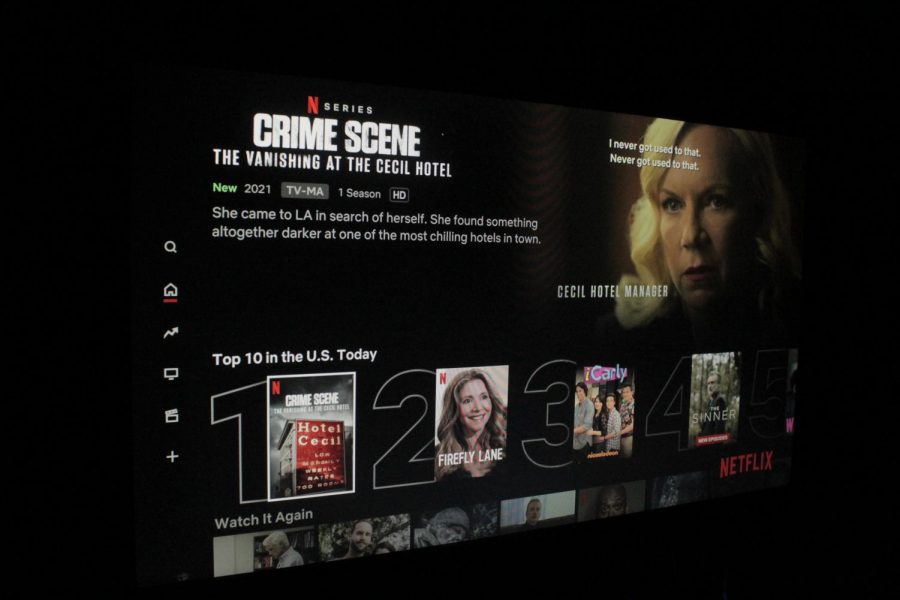The era of AI centric, technophobic horror movies is in full swing, with films like “M3GAN” (2022) and “Subservience” (2024) topping the charts in recent years. “Companion,” Drew Hancock’s feature directorial debut, follows suit in this gory, satirical horror flick about bloody weekend getaway.
I went into “Companion” completely blind, and it’s safe to say my hand flew over to cover my mouth at the twist revealed about 30-minutes into the film. That being said, if you’re thinking of watching this movie, I recommend you do the same and come back to reading this after you’ve watched.
“Companion” follows Iris (Sophie Thatcher) and Josh (Jack Quaid) as a perfect, picture-esque young couple. Their romance began in a grocery store, when they locked eyes and suddenly — according to Iris — her life had meaning.
But in fact, this did not happen. This memory was one programmed into Iris’ system, as, unbeknownst to her, she is actually a “companion robot” that Josh has rented and brought along to a weekend getaway with friends at a remote lakehouse.
Josh is able to program Iris’ language, intelligence and even her aggression levels — with Iris’ sole purpose in life being to keep Josh happy.
When things take a turn at the lakehouse and Iris kills a friend of Josh’s in self defense when he tries to force himself on her, Josh must confront Iris with the truth and threatens to shut her down after her act of violence.
As you can imagine, Iris does not quite like to hear this and she makes a break for it into the forest while Josh and his friends Kat (Megan Suri), Eli (Harvey Guillén) and Patrick (Lukas Gage) aren’t looking.
We learn here that Josh and Kat have arranged for Iris to commit this murder by programming her aggression levels higher, so as to steal their late friend’s fortune of $12 million.
At this point in the movie, Josh is placed as the clear villain, fulfilling the role of the whiny, greedy incel who, as he believes, must work twice as hard against the rigged system.
Painting a world where the robots are favored over the humans introduces an interesting point – that humans should be held responsible for whatever mess technology or artificial intelligence creates, because, at the end of the day, humans created them.
However, Josh, the consumer, is made to be the movie’s villain, rather than the robot company, whose workers are given only a few short minutes of screentime and portrayed as friendly and unassuming. Shouldn’t we be villainizing the companies that profit off increasing levels of loneliness among our population, specifically among men, rather than those who fall victim to it?
On the other hand, the robots don’t seem to be the ones causing the problem here. Josh’s greed and control is what creates this mess, and Iris is our murderous, fiery hero who rebels against Josh’s belief that he has full power over her.
Thatcher’s portrayal of Iris’ confidence growth throughout the movie is spot on; she begins meek and worried, but grows in power, both physically and emotionally, once she’s able to put Josh’s wants second to her’s.
Quaid’s depiction of Josh in all his disagreeability, violence and callousness works as well; he’s very easy to hate. Kat, Eli and Patrick are the perfect troupe of horror movie friends, with the right amount of witty one-liners and likability .
The gore and scares are nothing too over the top, and the comedy and satire make up for any real uneasiness one might feel during the movie.
One view of this movie is as the traditional warning sign that comes along with robot movies – that one day we might lose control over them, and they’ll ultimately have their revenge.
Another view is that in a world where women are often viewed as nothing more than being at their partner’s beck and call, and are constantly fighting off people other than themselves having control over their bodies, “Companion” feels like a win.
“Companion” can be rented to watch on Prime Video or Apple TV.
This story was written by Annie Goode. She can be reached at annie.goode@marquette.edu.













